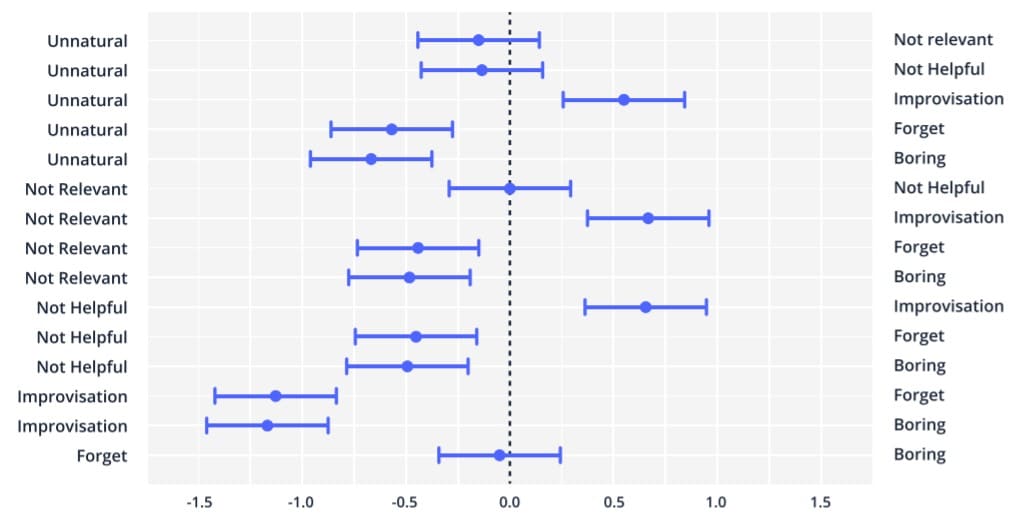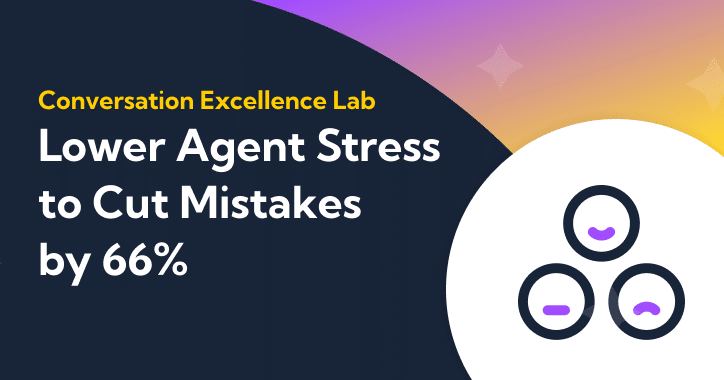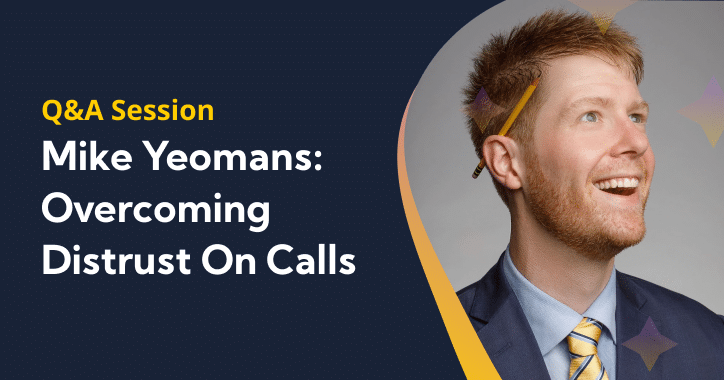Key Takeaways
- When agents make mistakes on calls that lead to negative outcomes, it’s because they forget what to say and should be coached.
- When agents intentionally go off script, it’s because they are improvising to get a better call outcome and should be encouraged.
- These are not opposing forces. Instead, they track an agent’s growth over time and can occur simultaneously.
In early 2021, Balto conducted a first-of-its-kind survey of over 1,000 agents to find out why they make mistakes on calls. In 2022, we published our findings on why agents intentionally go off their scripts. These two surveys are similar in their purposes (to learn why agents deviate from a call script) but surface two different results:
- When agents make mistakes on a call, it’s usually because they forgot what to say or they got nervous and it leads to poor call outcomes.
- When agents intentionally go off script, they are doing it on purpose because they believe it leads to better call outcomes.
On the surface, these two findings appear to cancel each other out: How could agents be forgetting what to say while also intentionally going off a script?
The key differentiators here are intent and experience. Both allow coachable moments and opportunities for positive reinforcement along the agent lifecycle.
Subscribe to future Conversation Excellence Lab reports below:
Why Agents Make Mistakes
In our 2021 report, we asked agents to pick the most common reason why they make mistakes on calls. Out of five possible choices, 65% of agents identified “human error” as their primary reason. Out of the five, agents said “Forgetfulness” was the main reason they made mistakes on calls.
Figure 1: Why Agents Make Mistakes On Calls
This is directly correlated with an agent’s experience level. It’s not until four years of experience on calls that agents start reporting lower rates of forgetfulness and higher rates of boredom and ineffective company training. In fact, from 5 years on, boredom replaces forgetfulness as the main reason agents make mistakes.
Figure 2: Mistakes On Calls by Agent Experience Level
It’s no surprise that newer agents sometimes forget what to say on calls, leading to poor script adherence and call outcomes. The first two years of an agent’s tenure have lower average levels of job enjoyment as well. This is the time when agents are learning the ropes of their job and how to use their scripts effectively, a high-effort period with a lot of evaluation and room for error.
For agents in this stage of their job, training is the most important resource managers can offer to agents. An overwhelming majority of agents in our survey identified company training and 1-on-1 coaching as helpful tools to mitigate mistakes. At the same time, we also know that contact center coaching is often ineffective in the first session. It may take a few sessions before coaching and training effectively sink in.
Why Agents Go Off Script
In our 2022 Script Adherence Report, we asked agents to rank the reasons why they intentionally go off script. Out of seven possible choices, agents ranked wanting to improvise as the main reason they go off script.
Figure 3: Why do agents go off script?
The lower the score, the higher the item was ranked by agents.
Meanwhile, agents ranked forgetting their script much lower, averaging around reason number four. We used statistical analysis methods to discern whether there were differences in responses between metrics.

Figure 4: Tukey's Range Test of reasons for going off script
We used this test to discern whether there were differences in responses between metrics. Anywhere that the range crosses the dashed line was not a significant difference between the responses for the two metrics.
At first glance, our findings on script adherence appear to contradict our 2021 survey. But in fact, they complement one another. The differentiating variable is intent:
- When agents make mistakes on calls, they attribute these to forgetfulness or nervousness. They didn’t intend to stray from the script.
- When they stray from their script on purpose, they are most likely to attribute this to the desire to improvise or deficits in the script itself.
Agents can go off script for a variety of reasons. While scripts are written with best practices in mind of how to best handle calls, it's also an agent’s responsibility to bring the call to the best conclusion, which may involve making their talk track sound more natural, or more relevant to the conversation at hand. Successful improvisation means an agent has internalized their script and knows where to make improvements.
This confidence should not be reprimanded or taken for granted. Agents who can successfully improvise on a call are demonstrating a desire to achieve better call outcomes. They want to take ownership of their calls and use creative thinking to ensure a good outcome.
This is not the same as making an unintentional mistake. Rather, it’s something that takes time to learn and can only occur after internalizing a script with lots of practice.
How to Fix Call Mistakes While Making Room for Improvising
In an agent’s early work or during major script changes, they are working on delivering the script correctly and need coaching to address unintentional mistakes. At this stage, improvisation is less helpful.
Luckily, we found that agents want training and coaching to address mistakes on calls. As they actively work towards owning their script, you can ensure your agents have access to both. Keep in mind that one coaching session is almost never enough to make a skill stick; consider investing in additional tools that help reinforce your goals or support agents while they are live on the call.
You can also increase script adherence by involving agents in the script writing process. We asked the participants in our study to rate, on a scale of 1-5, how involved they were in writing their scripts. Our analysis found that the more agents are involved in writing their scripts, the more they’ll follow them. Those who reported the lowest involvement in script writing were the most likely to want to change everything about their script, and those who wanted to change nothing at all had the highest rate of involvement as a group.
Once an agent has internalized their script, they can see areas for improvement and are willing to act on them. At this stage, improvisation should be encouraged with a few actions:
- Communicate your expectations: Be clear with your agents on what parts of their scripts need to be followed exactly on every call, and where there is room for improvisation.
- Get feedback: Invite agents to provide constructive, specific feedback on their scripts on a regular basis.
- Reward ownership: When agents make suggestions that lead to better call outcomes, let them know you appreciate their input. Share their insights with the rest of the team.
- Embrace change: Though scripts are written with great care, that doesn’t mean they’ll be effective forever. Don’t be afraid to solicit feedback from your agents and consider new ideas.
Subscribe to future Conversation Excellence Lab reports.
Sources
Balto. (2021, January 11). 2021 Contact Center Agent Survey Report - Balto Ai. RSS. Retrieved June 28, 2022, from https://www.balto.ai/research/2021-agent-report/
Balto. (2021, October 22). We Surveyed 500 Managers About Call Center Coaching. Conclusion: It’s Not Working - Balto Ai. RSS. Retrieved June 28, 2022, from https://www.balto.ai/research/call-center-coaching-manager-survey/
Balto. (2022, March 29). Contact Center Attrition: What Agents Want in 2022 - Balto Ai. RSS. Retrieved June 28, 2022, from https://www.balto.ai/research/contact-center-attrition-2022/
Balto. (2022, June 28). The Case For the Anti-Script: A Multifactor Analysis of Script Adherence - Balto Ai. RSS. Retrieved June 28, 2022 from https://www.balto.ai/research/script-adherence






